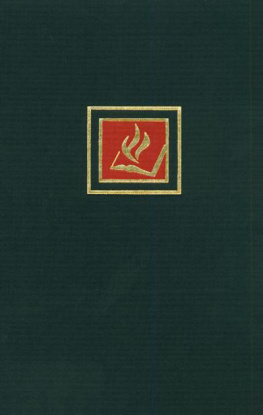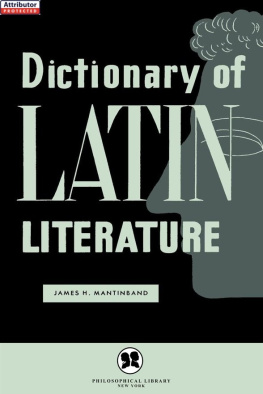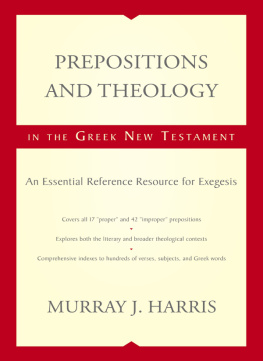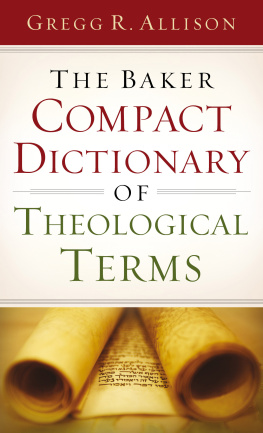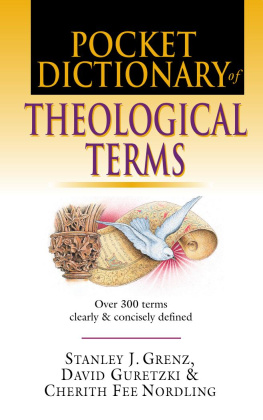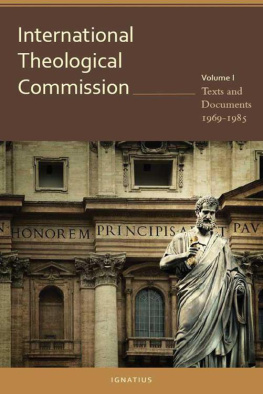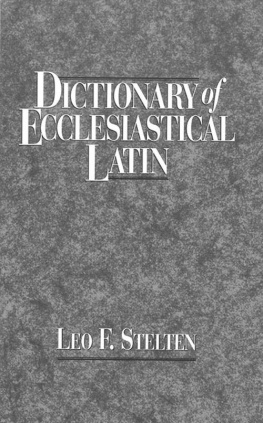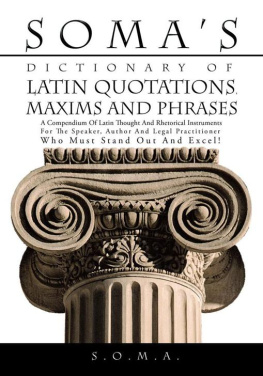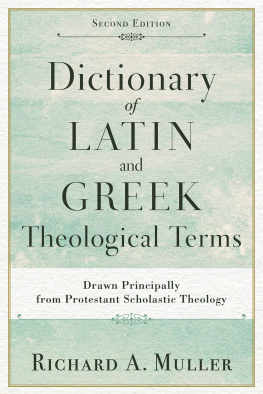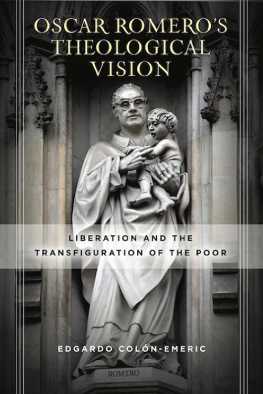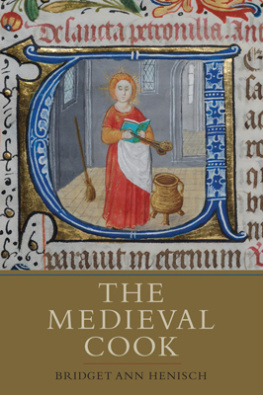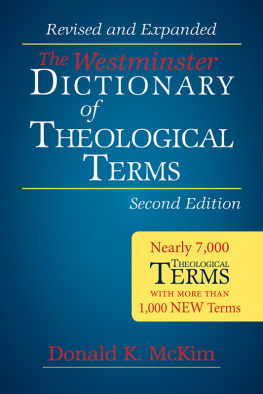CONSECRATED PHRASES
Consecrated Phrases
A Latin Theological Dictionary
Latin Expressions Commonly Found
in Theological Writings
THIRD EDITION

James T. Bretzke, SJ

LITURGICAL PRESS
Collegeville, Minnesota
www.litpress.org
A Michael Glazier Book published by Liturgical Press
3rd edition
Cover design by Ann Blattner.
2013 by Order of Saint Benedict, Collegeville, Minnesota. All rights reserved. No part of this book may be reproduced in any form, by print, microfilm, microfiche, mechanical recording, photocopying, translation, or by any other means, known or yet unknown, for any purpose except brief quotations in reviews, without the previous written permission of Liturgical Press, Saint Johns Abbey, PO Box 7500, Collegeville, Minnesota 56321-7500. Printed in the United States of America.
The Library of Congress has cataloged the printed edition as follows:
Library of Congress Cataloging-in-Publication Data
Bretzke, James T., 1952
Consecrated phrases : a Latin theological dictionary : Latin expressions commonly found in theological writings / James T. Bretzke, SJ. 3rd edition. pages cm A Michael Glazier book. ISBN 978-0-8146-8214-2 ISBN 978-0-8146-8239-5 (e-book) 1. Catholic ChurchTerminology. 2. TheologyTerminology. 3. Latin languageChurch LatinTerms and phrases. I. Title. BX841.B68 2013 230.03dc23 2012047221
To My Students
Contents
Preface to the Third Edition
Quidquid latine dictum sit altum videtur (That which may be said in Latin seems deep) was one page in a Latin Phrase-a-Day I received some time ago as a gift. To the best of my knowledge, though, this is not a consecrated phrase, as I have never seen it used in any other context. Humorous to be sure, it also touches on an aspect of the rest of the Latin phrases contained in this third edition: all of them represent a good deal of wisdom in the Western classical tradition. This third edition contains 50 percent of new entries from the second edition, and many of the entries in the earlier editions likewise have been expanded and extensively cross-referenced so that the resulting volume not only functions better as a guide to translation of these phrases but also helps delve more deeply into the tradition out of which the consecrated phrases arose. The third edition contains a good deal of entries from canon and civil law, as well as terms from philosophy and theology. While Latin has often been called a dead language, I believe this book shows convincingly that the tradition continues not only to live but to thrive and will aid generations yet to come in understanding, appropriating, and developing the best of that tradition.
I would like to thank in a special way Rev. Mark Massa, SJ, my academic dean at the Boston College School of Theology and Ministry, who supported my sabbatical application, which allowed completion of this project, as well as the Jesuit Community of Marquette University in Milwaukee, Wisconsin, who hosted me while I finished this volume.
Finally, I would like to thank all of my students over the last two decades who have supported this ongoing project and to whom I gratefully rededicate this volume.
31 July 2012Solemnity of St. Ignatius LoyolaFounder of the Society of JesusChestnut Hill, Massachusetts
Introductory Note and Preface to the First Edition
A consecrated phrase refers to an expression that is used, often in a shorthand manner, to express a certain theological position or thought, such as ex opere operato, which expresses a significant position of Roman Catholic sacramental theology as defined at the Council of Trent, or finis operantis , which refers to the importance of the intention of the person (the agent) in evaluating moral actions. Often these terms appear simply in a given theological text and no, or little, effort is made either to translate or explain such terms. The aim of this dictionary is to compile, translate, and briefly explain these Latin consecrated phrases, which are found with some frequency in theological writings and canon law and which therefore may puzzle readers unfamiliar with Latin and/or the theological meaning and nuances of these terms. For example, someone familiar with Latin may be able to translate each of the words ex opere operato (by the work performed) but still be in some doubt as to precisely what this term means in theological usage. Each entry in this dictionary gives first a rather literal translation of the Latin term or phrase and then in most cases a brief gloss on the theological meaning and/or significance of the term. However, this dictionary is designed primarily for quick consultation in order to give the reader a general idea of what might otherwise be a puzzling expression. Other dictionaries or encyclopedias of theology should be consulted if one wishes a fuller theological and/or historical discussion of the term in question. While most of the entries contain theological, liturgical, canonical, and/or philosophical terms primarily from the Roman Catholic tradition, important expressions in the various Protestant traditions are also included, as well as a number of common classical aphorisms, such as In vino veritas (In wine there is truth).
Latin titles of many church documents are also included and are further indicated as being a title by being printed in bold type , such as Gaudium et spes. Since such document titles are derived from the opening words of the given document itself, the literal translation of a given document (Joy and hope, in this case) does not always indicate clearly what the document concerns. In most cases an English subtitle is supplied, which is a better guide to the nature and content of the document in question.
Entries are listed according to the form most likely to be used in the expressions themselves as found in theological writings or references. Thus, the nominative singular of nouns or the infinitive form of verbs normally would not necessarily be the usual entry form. For example, the Latin word for God is Deus , and yet many other common expressions involving the use of God occur in the other grammatical cases, such as Dei (genitive, used in the possessive sense), Deo (dative or ablative, used as indirect objects and/or with certain prepositions) and Deum (accusative, used as a direct object). While efforts have been made to cross-referencing the entries as much as possible, given the fluidity of Latin word order not every possible grammatical form has been entered. Thus, if one is looking for non licet (not legal) and cannot find this term listed under the letter N, one might try looking for licet under the letter L (which will yield a better result). Similarly, since word order can be easily varied in Latin one might try looking for the meaning of the phrase by taking the last word instead of the first or some other word in the phrase. Thus, if one cannot find Amor vincit omnia under the letter A, a second search under the letter O might produce Omnia vincit amor (Love conquers all).
Finally, some common scholarly abbreviations and terms, such as ibid. ( ibidem ), i.e. ( id est ), q.v. ( quod vide [which see]), etc., are also included.
Most of the entries contained in this dictionary have come from my own reading of various theological texts, and thus the dictionary makes no pretensions to be exhaustive and complete. I would be grateful if readers suggest other entries for this dictionary, especially for items which are used in theological writings and left untranslated in the given text. Finally, recognizing the basic truth of the adage errare humanum est (to err is human), I would also be grateful if one comes across typographical and/or grammatical errors as well as any other inaccuracies or unclear and/or misleading definitions in these listings.
Next page
